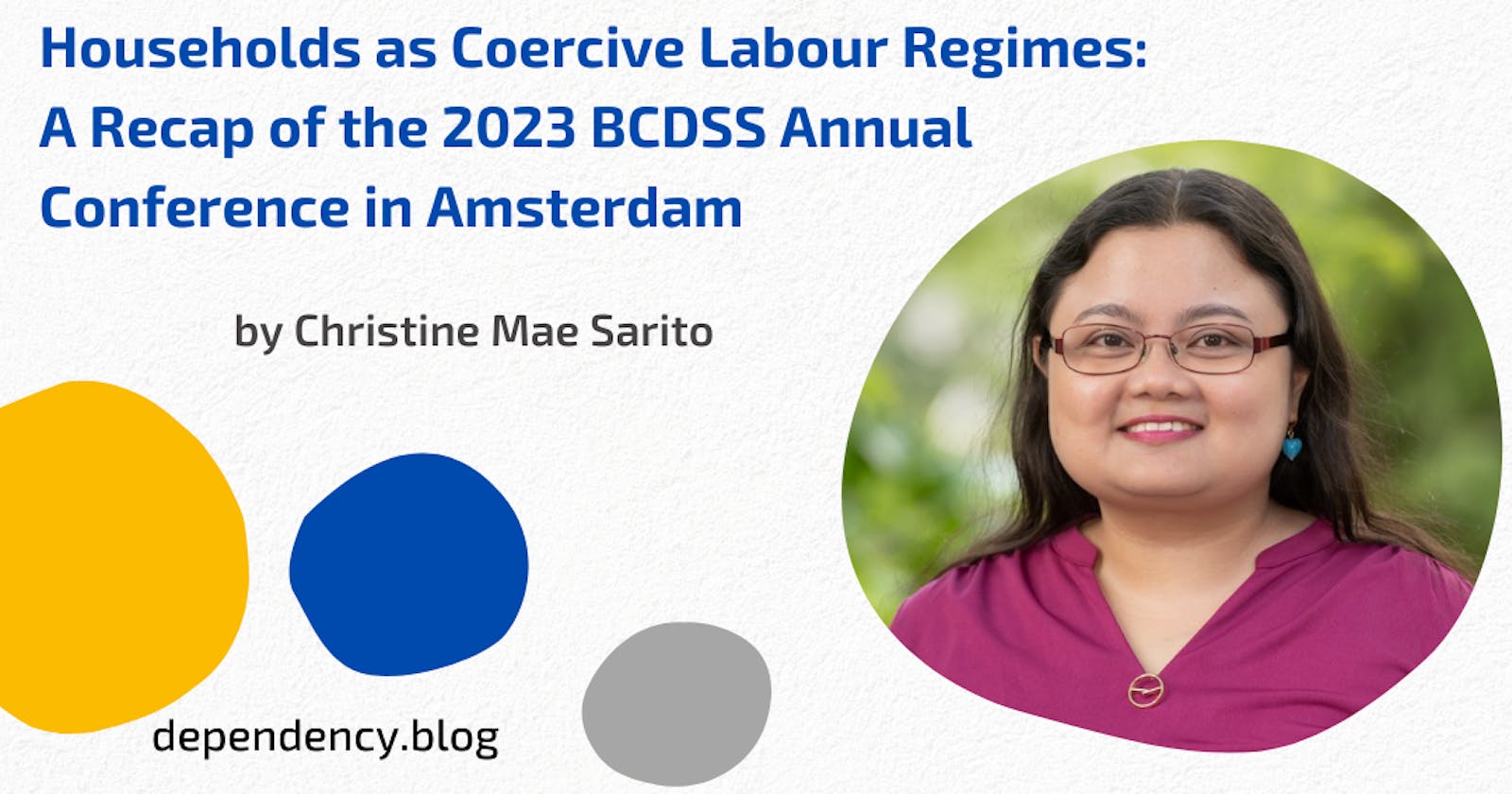Households as Coercive Labour Regimes: A Recap of the 2023 BCDSS Annual Conference in Amsterdam
The 2023 BCDSS Annual Conference on Households as Coercive Labour Regimes gathered scholars at various stages of their careers at the International Institute of Social History (IISH) in Amsterdam, Netherlands, on 2-3. November 2023. BCDSS Speaker Prof. Stephan Conermann, IISH Research Director Prof. Karin Hofmeester, and IISH Senior Researchers Prof. Ulbe Bosma and Prof. Matthias van Rossum jointly organised the conference.

The Internationaal Instituut voor Sociale Geschiedenis {IISG} (International Institute of Social History) in Amsterdam, Netherlands; view from the bridge at the C. van Eesterenlaan Street (BCDSS, 2023)
The red thread that ran throughout the various presentations and panels, which featured case studies from different periods and contexts ranging from ancient Sumer to twentieth-century Russia, was a consideration of coercive labour through the lens of the household.
Prof. Conermann kicked off the opening session on the morning of 2. November and gave all participants a chance to introduce themselves. The self-introductions helped break the ice and made everyone feel more comfortable engaging in the subsequent discussions, especially during the Q&A times.
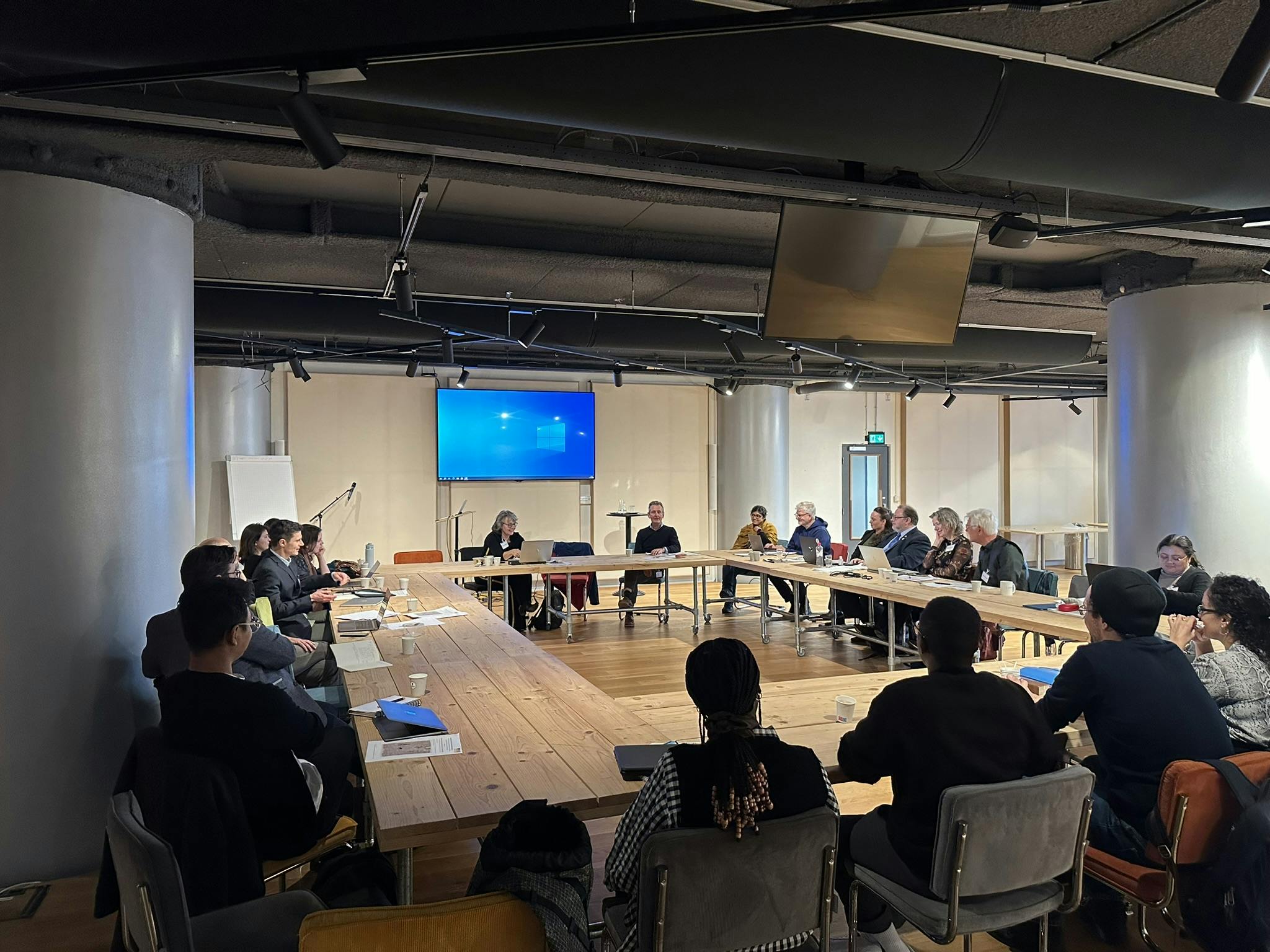
The conference participants during the self-introductions (BCDSS, 2023)
The opportunity to introduce ourselves was also informative, allowing participants to share research interests, fascinating stories, and a few laughs. Prof. Göran Rydén of Uppsala University told us that one of his colleagues called him by the nickname “Iron Man.” Prof. Rydén said he was called “Iron Man” because of his work on the history of ironmaking in Sweden and elsewhere. Prof. John F. Chuchiak IV of Missouri State University, a BCDSS Fellowship Alumnus, began his self-introduction with the statement, “We are what we research,” which garnered some audible (positive) reactions. It also gave me pause as I asked myself, “Do my research interests represent me as a student, a scholar, and/or a person?” I wonder if my fellow PhD Researchers asked themselves a similar question and whether they knew how they would like to answer it.
After the self-introductions, we proceeded to the first panel of presentations, chaired by Prof. Bosma. The first panel consisted of presentations by Prof. Elise van Nederveen Meerkerk of Utrecht University and BCDSS’ Dr. Vitali Bartash and Honey L. Hammer.
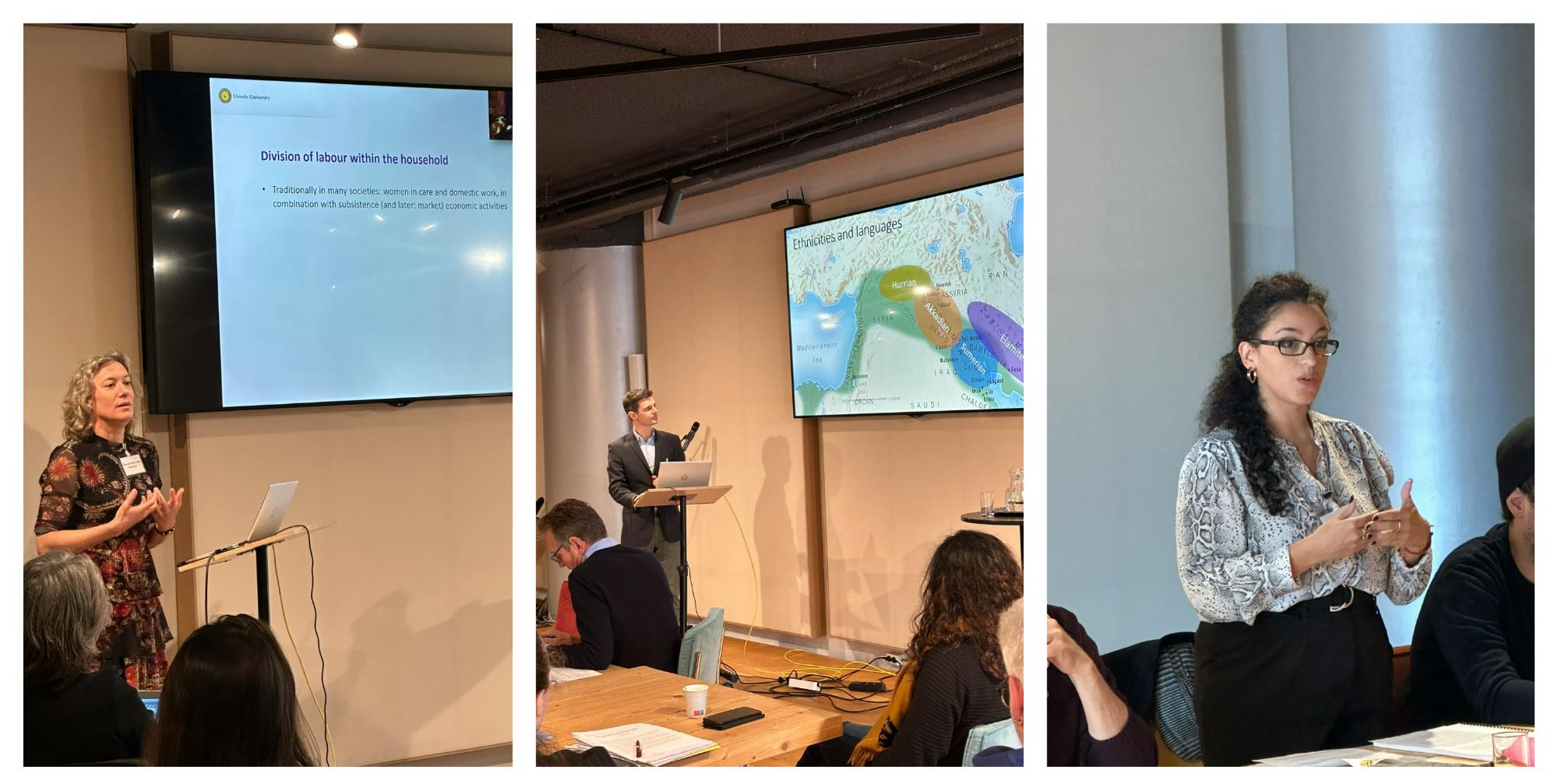
From left to right, Prof. Elise van Nederveen Meerkerk, Dr. Vitali Bartash, and Honey L. Hammer (BCDSS, 2023)
In her presentation, “Serving the Household: Work, Coercion and Patriarchy in Global History,” Prof. van Nederveen Meerkerk showed the complex relationships between patriarchy, coercion, and division of work within households. She emphasised the relationship between the “productive” labour associated with men and the “reproductive” labour associated with women. Prof. van Nederveen Meerkerk also stressed that despite the similarities between internal hierarchies in the household across various historical contexts, the division of labour significantly differed among the men, women, children, and enslaved people that composed the household across time and space.
In his paper, “The Households of the Royal Children in Sumer and their Dependants,” Dr. Bartash compared the dependants and labourers in the two estates of the ruler’s children in Sumer. The first case involved the household of the ruler’s children in Girsu (ca. 2320 and 2110 BC), and the other referenced the estate of Ninsaga, the daughter of the governor of Irisagrig (2025–2024 BC). Using Sumerian archival documents as principal sources, Dr. Bartash shed light on the precarious economic and social situations of these dependants in both estates, especially of the foreign prisoners of war and enslaved people.
Honey L. Hammer explored the mechanisms of coercion utilised in the ancient Egyptian household in her presentation, “Household Coercion in Ancient Egypt: An Analysis of the Heqanakht Letters.” Ms. Hammer shared a detailed account of the daily life of an Egyptian household during the Middle Kingdom period. She also offered insights into the lives of household members and the management of the household, with its head maintaining control even while working away from home.
The second panel of presentations, still chaired by Prof. Bosma, included presentations from Dr. Niall Ó Súilleabháin of the Centre d’études supérieurs de civilisation médiévale (CESCM-UMR 7302), Centre nationale de la recherche scientifique/Université de Poitiers and Prof. Göran Rydén of Uppsala University.
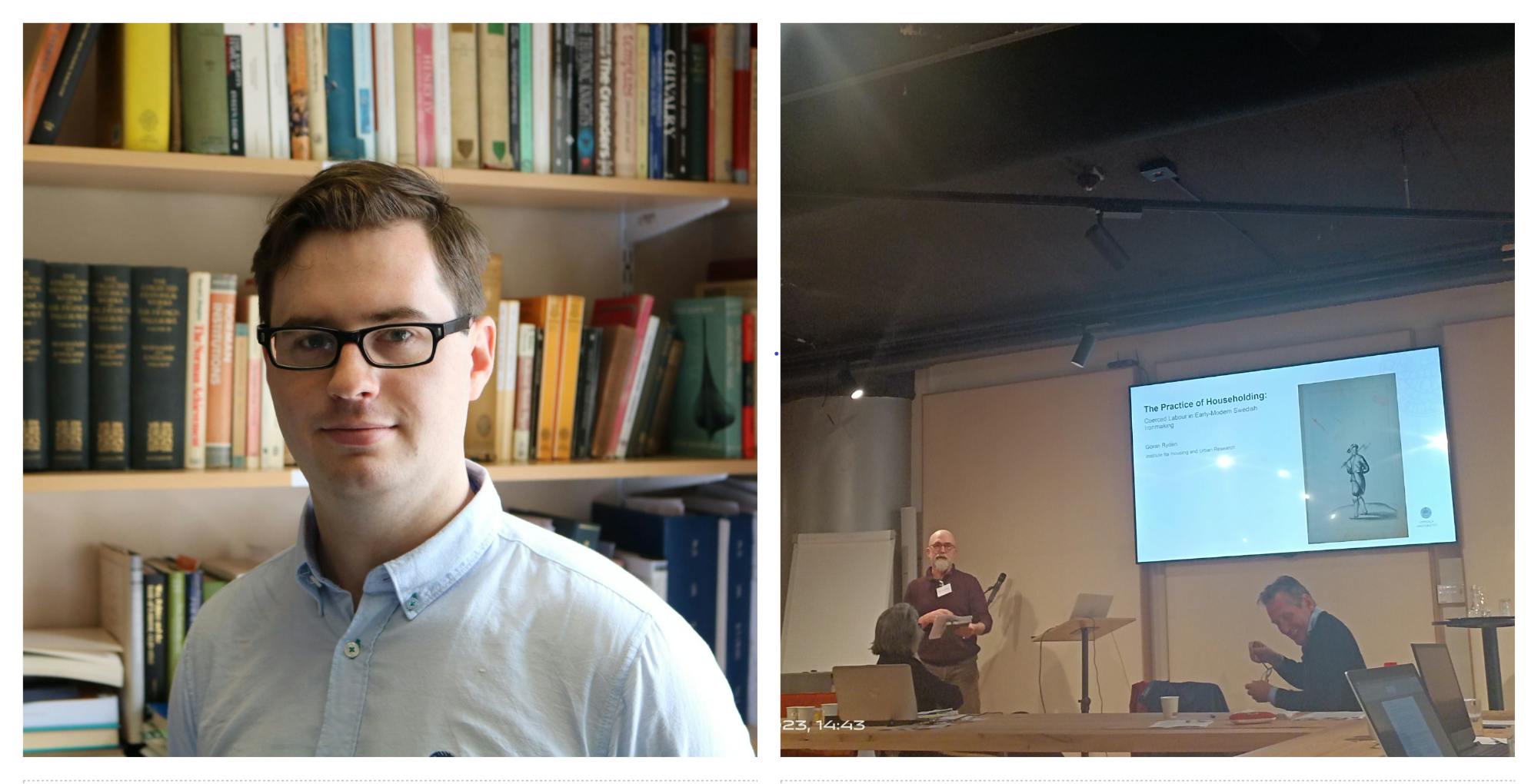
Dr. Niall Ó Súilleabháin (WORCK, 2021) and Prof. Göran Rydén
In a presentation titled “All in the Familia? Coerced Labour and the Monastic Household in Northern France (c. 850 – c. 1100),” Dr. Ó Súilleabháin unveiled the implications of understanding the labour of new entrants to the monastic familia. With the abbeys of Marmoutier and St.-Pieters as his case studies, Dr. Ó Súilleabháin argued that the language and ideals of the familia reinforced the asymmetrical relationships between the monasteries and their dependants.
Following Dr. Ó Súilleabháin’s presentation, in “The Practice of Householding: Coerced Labour in Early-Modern Swedish Ironmaking,” Prof. Rydén discussed the term hushållning (‘householding’), with particular reference to the way it was used within the Swedish iron trade. In this context, Prof. Rydén showed that in the Swedish bruk, composed of skilled artisans, day labourers, miners, peasants, etc., living together in various forms of households, the artisans and their households were subordinated by other members of this socially complex society. He also credited the gender division of labour, with women working on petty farms, as a significant factor in the feasibility of iron production.
Prof. Hofmeester chaired the third and final panel of the first day of the conference, which featured presentations by Prof. John F. Chuchiak IV of Missouri State University and Rosamund Fitzmaurice of the University College London, who is a BCDSS Fellowship Alumna as well.
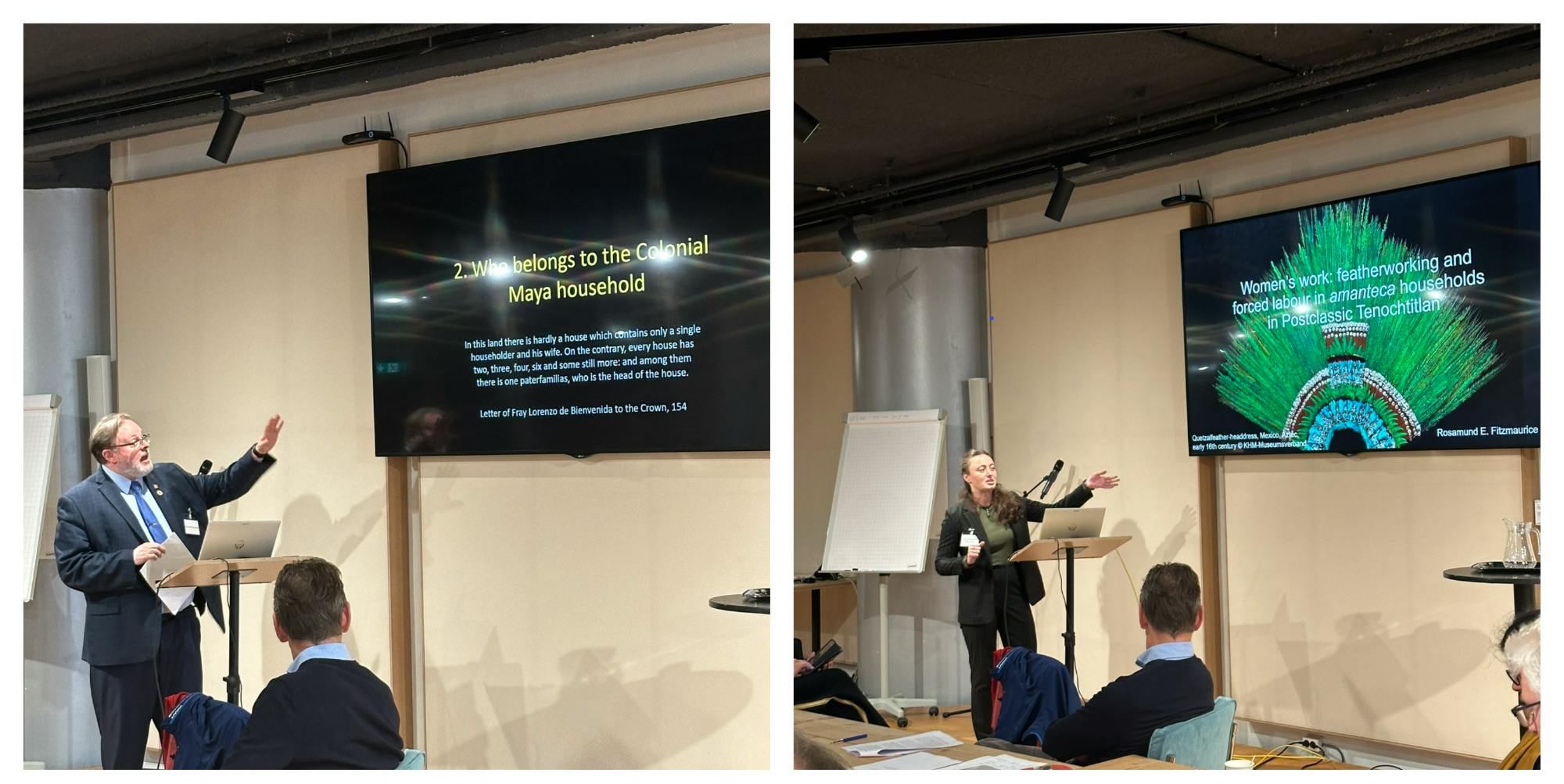
Prof. John F. Chuchiak IV and Rosamund Fitzmaurice (BCDSS, 2023)
Prof. Chuchiak presented a paper titled “‘Our Suffering this Harsh Castilian Tribute:’ The Changing Nature of Spanish Conquest and Colonialism on the Coerced Labor Regimes of Colonial Maya Households, 1542-1821.” He reflected upon the extended nature and dispersed settlement patterns of the Maya household and how they complicated the process of Christian evangelisation, census, and the collection of tribute during the period of the Spanish Conquest. He showed that the Spanish colonial impositions put substantial economic burdens on women, as, in addition to managing their respective households, they also had to work into the night to ensure payment of their tribute.
Rosamund Fitzmaurice’s talk, “Women’s Work: Featherworking and Forced Labour in Amanteca Households in Postclassic Tenochtitlan,” proposed that forced labourers were among the extra workers that performed the domestic duties of women during the period. Because of the extra workers, the women of the Amanteca households eventually began to focus on featherworking, as well as teaching young boys and girls how to become master featherworkers. While the Amanteca households benefited greatly from the lucrative and honourable trade of featherworking, forced labourers who performed household work lived precariously. According to Ms. Fitzmaurice, other forced labourers were not so lucky. Instead, to display the wealth of Amanteca households, they were killed along with war captives during ceremonies.
After the third panel comes the conference dinner. It may be common to host conference dinners exclusively for the organisers and speakers on the first day of the conference. Some BCDSS people who were non-paper presenters like me were already planning where we would have dinner on the first day of the conference when Prof. Hofmeester announced that everyone was invited to dinner. We were delighted, especially since it was raining heavily outside. I appreciated that the organisers invited everyone to be more inclusive.
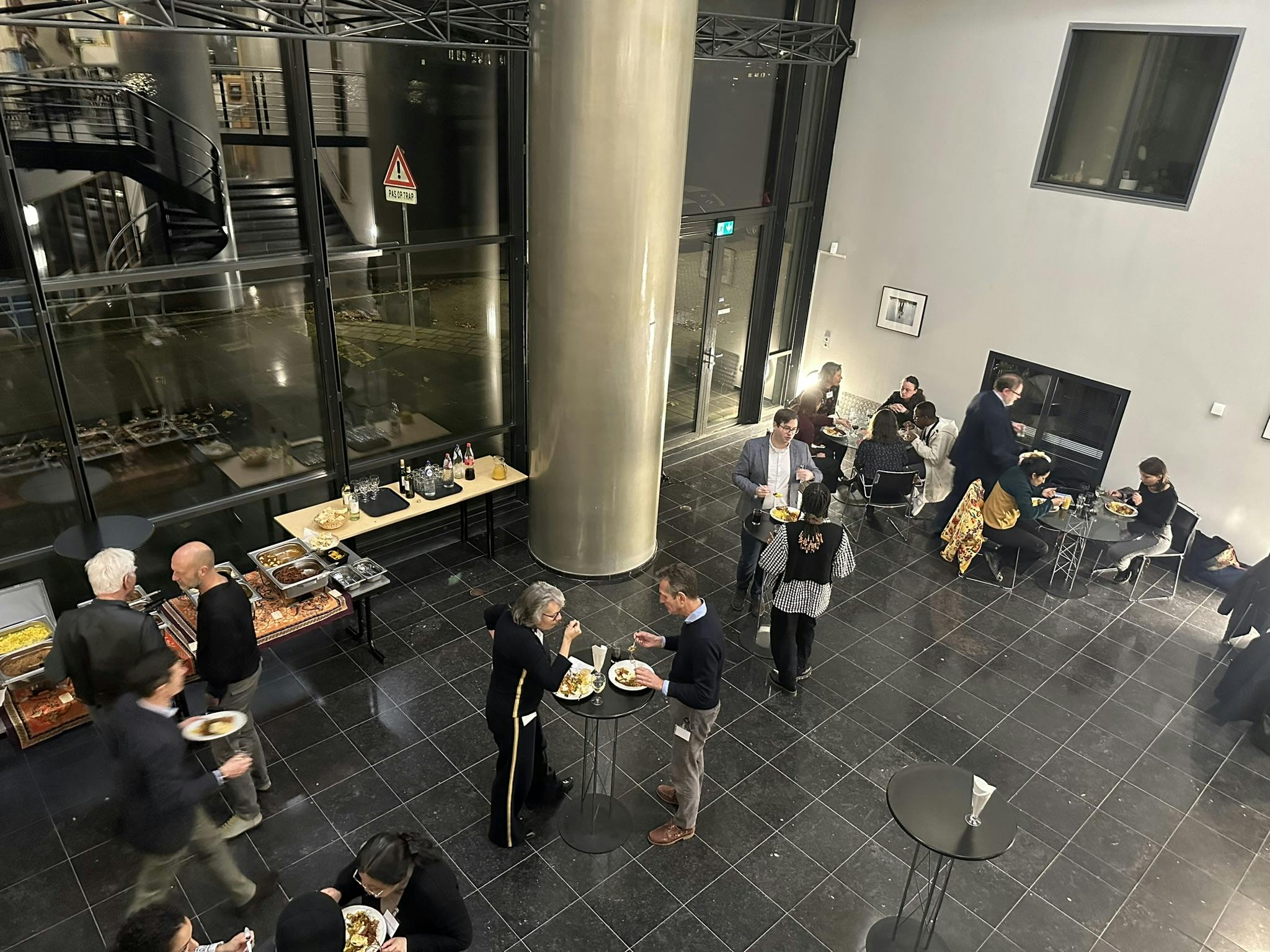
The conference dinner (BCDSS, 2023)
The conference resumed on 3. November, beginning with the fourth panel chaired by Prof. Conermann and the presentations of Dr. Emma Kalb of the BCDSS and Dr. Yaruipam Muivah of the École des hautes études en sciences sociales (EHESS).
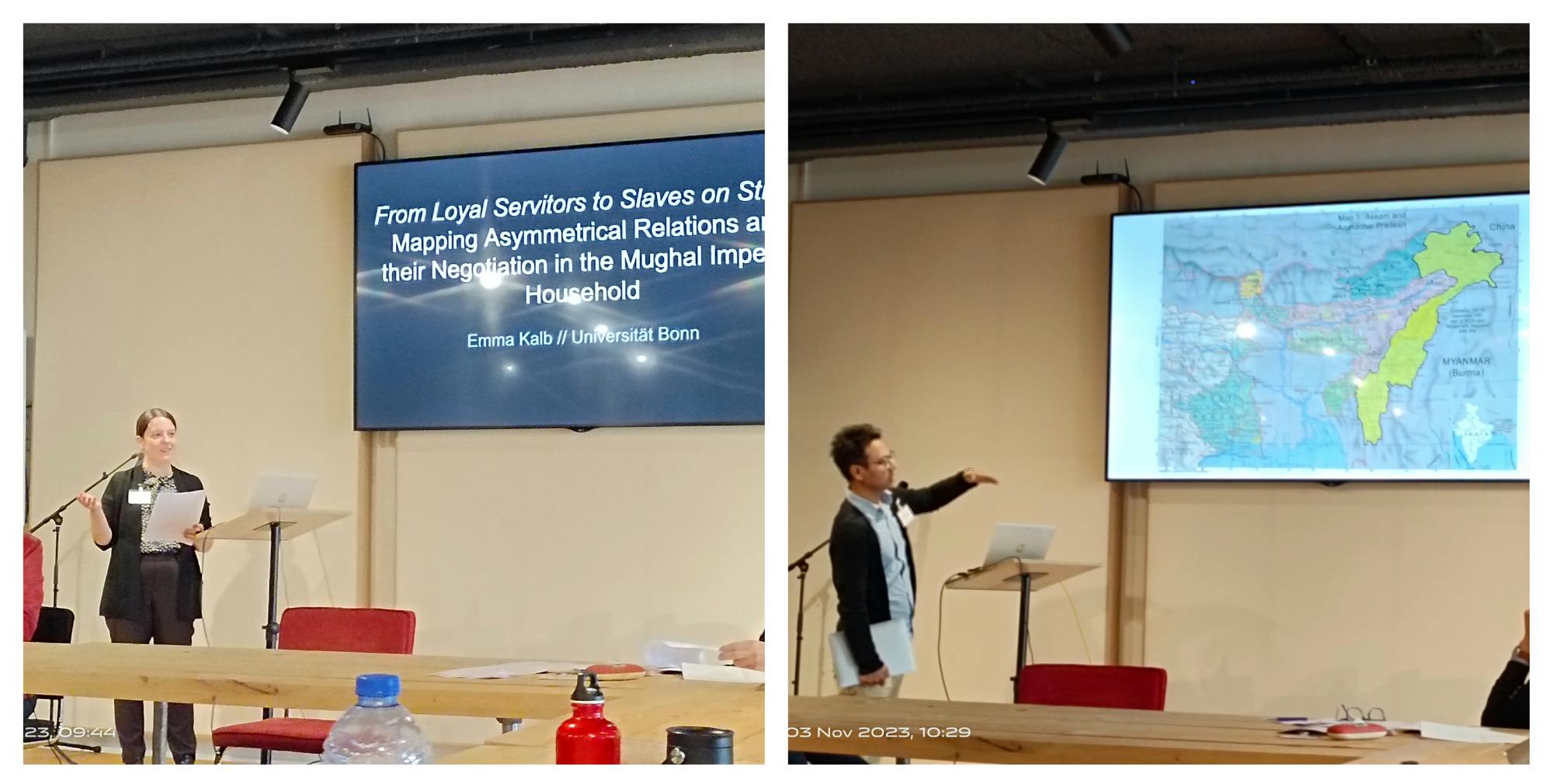
Dr. Emma Kalb and Dr. Yaruipam Muivah
In “From Loyal Servitors to Slaves on Strike: Mapping Asymmetrical Relations and their Negotiation in the Mughal Imperial Household,” Dr. Kalb turned her attention to the eighteenth century and the eunuch harem guards’ strike due to the non-payment of their stipends. She argued that the harem guards were able to improve their own conditions by strategically staging their strike and invoking their claims as loyal slaves upon the palace. Dr. Kalb’s case study also surveyed the broader spatial and labour regime of the Mughal Imperial household, opening up new possibilities for approaching the institution.
Dr. Muivah’s paper, “The Bawi System and the Making of the Chief’s Household in the Lushai Hills in North-East India,” argued that the bawi system, wherein the Chief took care of the boi in exchange for the labour and services of the latter, shaped the slavery debate in the Lushai Hills during the colonial era. Despite being seen as a mutually beneficial relationship, Dr. Muivah argued that the bawi system exploited poor and enslaved people. The system also allowed the Chief to employ violence as a means to control the boi.
Dr. Gijs Kessler of the IISH, Boluwatife Akinro of the BCDSS, and Alaz Kanber of the University of Turin gave presentations during the sixth and final panel of the annual conference, which Prof. Chuchiak chaired.
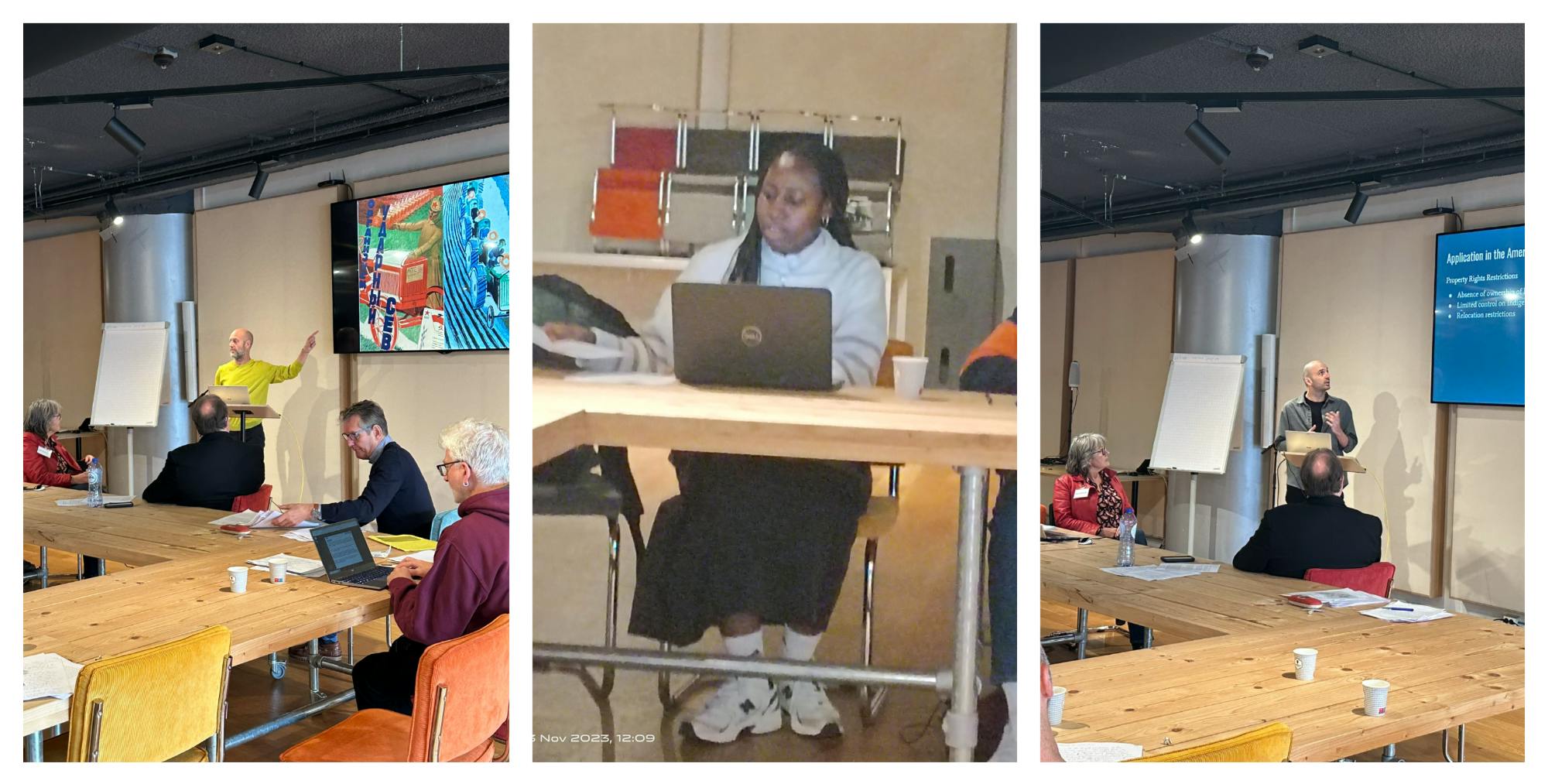
Dr. Gijs Kessler (BCDSS, 2023), Boluwatife Akinro, and Alaz Kanber (BCDSS, 2023)
Dr. Kessler’s paper was titled “The Soviet Collective Farm: Boundaries of a Coercive Labour Regime (1929-1941).” He investigated Soviet collective farms as both households and coercive labour regimes. To determine whether it is accurate to delimitate the Soviet collective farm as a coercive labour regime, Dr. Kessler analysed its symbiosis with the peasant household. He concluded that, in the 1930s, the Soviet collective farm exhibited the traits of a household but, despite the efforts of their proponents, failed to capture the household ethos during that period. Moreover, though the collective farms were indeed coercive labour regimes, they lacked characteristics commonly associated with such social institutions. The practice also significantly disrupted established patterns of labour within households, leading to substantial repercussions for the distribution of labour and the economic framework of peasant incomes.
In “Second Class Family: Tradition and Dependency in the Yórùbá Household Structure,” Buluwatife Akinro explored the ilé, the traditional Yórùbá household system, as a structure of dependency. In contrast to interpretations of “social seniority” as a mutually beneficial organising structure. She examined this principle as one that contains an element of coercion, both historically and in the present.
In “The Encomienda as a Coercive Labor System: A Brief History of Its Establishment and Evolution in Spanish America in the 16th Century,” Alaz Kanber analysed how the application of Spanish law in the Americas brought about the coercive characteristics of the encomienda system. He argued that the encomienda system was not only a symbol of the intricacies of Spanish legal measures but, more importantly, a symbol of both the exploitation and the resilience of coerced labourers.
Before the conference's conclusion, we had a lively plenary discussion in which we attempted to sketch definitions of households, primarily based on the context of the speakers’ research. Prof. van Nederveen Meerkerk then wrapped up the event, summarising each speaker's contributions. Finally, Prof. Conermann offered words of gratitude and commendation.
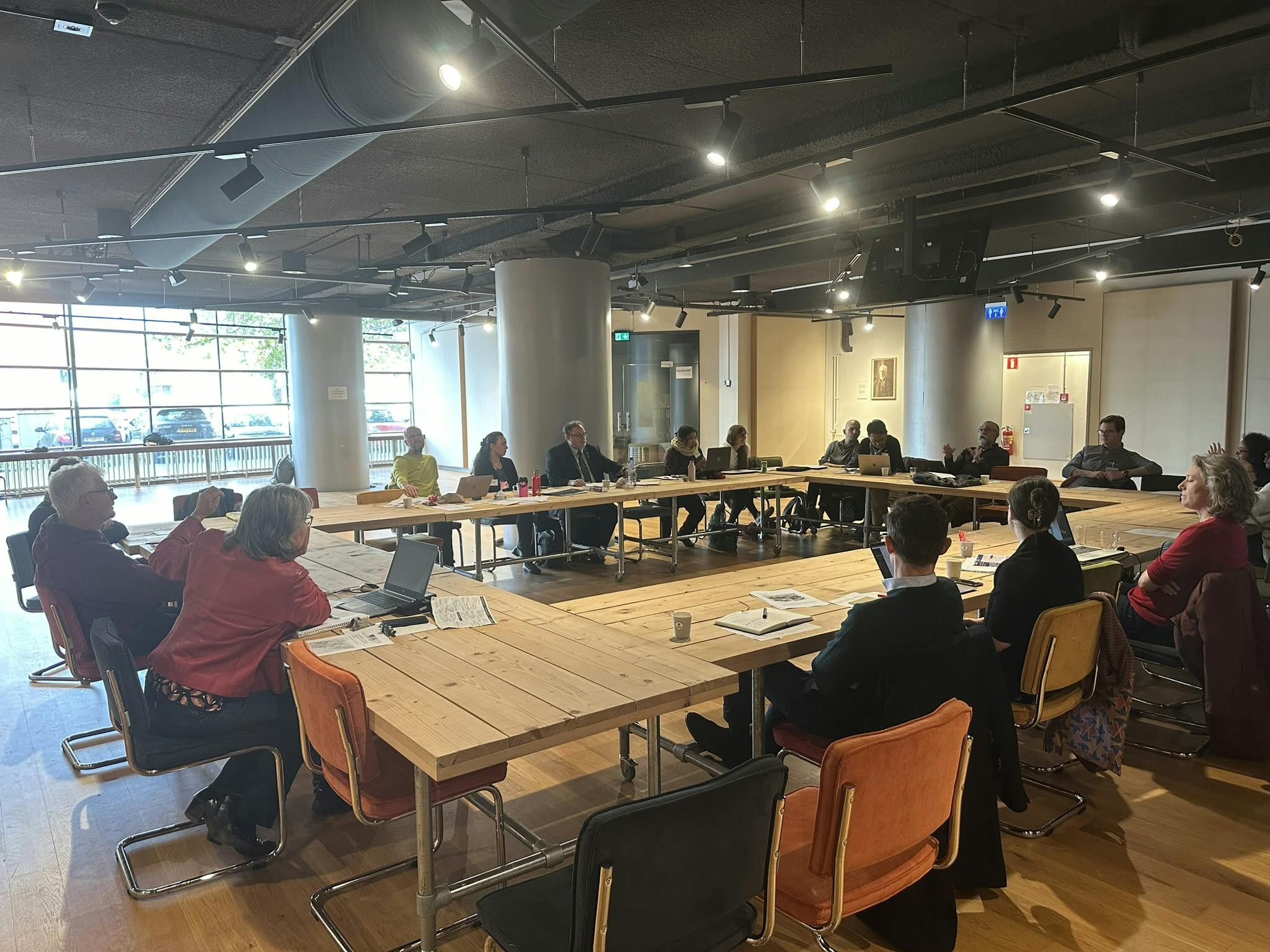
The conference participants during the plenary discussion. (BCDSS, 2023)
As our discussions of households as coercive labour regimes concluded, Amsterdam’s pouring rain and strong winds provided an unexpectedly poignant backdrop to the deeper reflections that emerged during our time together. Listening to the presentations was an enriching experience, which made me rethink my understanding of households as a concept.
While I always associated the term ‘household’ with warmth, home, and family, the conference revealed that this heartwarming concept holds layers of complexity.
Witnessing the applause for the excellent presentations of fellow BCDSS PhD Researchers Honey and Boluwatife, which I have thankfully captured on video, was particularly inspiring. Their contributions, along with those of other scholars, have undoubtedly left a lasting impact on my academic journey. I look forward to future conferences and the continued exploration of such thought-provoking topics.

